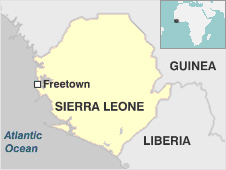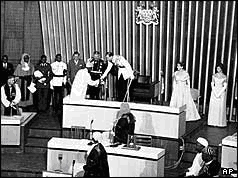Sierra Leone Celebrates 49 Years of Independence
27 APRIL 1961 – 27 APRIL 2010
Congratulations to the people of Sierra Leone on
your 49th Independence Anniversary
Happy Birthday to You Mama Salone and God Bless as
Always!!
Wishing you a much brighter future
The Sierra Leone Telegraph
Sierra Leone is 49
Years Old Today: A trip down Memory Lane with the
help of BBC News
Sierra Leone has become the latest West
African state to win independence, after
more than 150 years of British colonial
rule.
The new nation was born at the stroke of
midnight, when its green, white and blue
flag was unfurled. A huge crowd,
gathered at Brookfields Playground in
Freetown to watch the historic moment,
broke into tumultuous cheering.
Independence Day formally began as the
Duke of Kent handed over royal
instruments recognising Sierra Leone as
an independent nation.
Sir Maurice Dorman, Governor since 1956,
was then sworn in as Governor-General by
Chief Justice Beoku Betts.
Messages of welcome to the new
government, led by Prime Minister Sir
Milton Margai, came from the Prime
Minister, Harold Macmillan, and from the
Queen.
Her Majesty is due to visit Sierra Leone
during her tour of West Africa later in
the year.
|
|

 |
State of Emergency
Independence festivities have been taking place all
week, mainly centred on the harbour area of
Freetown. Three days of public holiday have been
declared, and the city is in party mood, with
streets decorated with bunting and the new national
colours everywhere.
But the build-up has been overshadowed by the state
of emergency, declared ten days ago following a
campaign of sabotage by the opposition All People's
Congress Party (APC).
The party has been urging that independence should
be postponed until free elections have been held.
The leader of the APC, Siaka Stevens, was arrested
just over a week ago, along with his right-hand man,
Wallace Johnston, and 16 other party members. They
had been planning a general strike to coincide with
the independence celebrations, and it was feared
riots would break out if the strike went ahead.
The government in Freetown is insisting that
elections will be held next year, as agreed under
the terms of independence. Ministers say the arrests
were made to protect those visiting the country for
the ceremonies, and, they say, there is every
intention to release those detained as soon as the
ceremonies are over.
1787 – 2010: How Did We Get
Here?
1787 - British abolitionists and philanthropists
establish a settlement in Freetown for repatriated
and rescued slaves.
1808 - Freetown settlement becomes crown colony.
1896 - Britain sets up a protectorate over the
Freetown hinterland.
1954 - Sir Milton Margai, leader of the Sierra Leone
People's Party, appointed chief minister.
1961 - Sierra
Leone becomes independent.
1967 - Military coup deposes Premier Siaka Stevens'
government.
1968 - Siaka Stevens returns to power at the head of
a civilian government following another military
coup.
1971 - Sierra Leone declared a republic, Stevens
becomes executive president.
1978 - New constitution proclaims Sierra Leone a
one-party state with the All People's Congress as
the sole legal party.
1985 - Major-General Joseph Saidu Momoh becomes
president following Stevens’ retirement.
1987 - Momoh declares state of economic emergency.
War and coups
1991 - Start of civil war. Former army corporal
Foday Sankoh and his Revolutionary United Front (RUF)
begin campaign against President Momoh, capturing
towns on border with Liberia.
New constitution providing for a multiparty system
adopted.
1992 - President Joseph Momoh ousted in military
coup led by Captain Valentine Strasser, apparently
frustrated by failure to deal with rebels. Under
international pressure, Strasser announces plans for
the first multi-party elections since 1967.
1996 - Strasser ousted in military coup led by his
defence minister, Brigadier Julius Maada Bio.
Ahmad Tejan Kabbah elected president in February,
signs peace accord with Sankoh's rebels in November.
1997 - Peace deal unravels. President Kabbah deposed
by army in May. Major Johnny Paul Koroma, in prison
awaiting the outcome of a treason trial, leads the
military junta - the Armed Forces Revolutionary
Council (AFRC). Koroma suspends the constitution,
bans demonstrations and abolishes political parties.
Kabbah flees to Guinea to mobilise international
support. The Commonwealth suspends Sierra Leone. The
UN Security Council imposes sanctions against Sierra
Leone, barring the supply of arms and petroleum
products. A British company, Sandline, nonetheless
supplies "logistical support", including rifles, to
Kabbah allies.
1998 February - Nigerian-led West African
intervention force Ecomog storms Freetown and drives
rebels out. Kabbah makes a triumphant return to
Freetown amid scenes of public rejoicing.
1999 January - Rebels backing Revolutionary United
Front leader Foday Sankoh seize parts of Freetown
from Ecomog. After weeks of bitter fighting they are
driven out, leaving behind 5,000 dead and a
devastated city.
A ceasefire is greeted with cautious optimism in
Freetown amid hopes that eight years of civil war
may soon be over. Six weeks of talks in the Togolese
capital, Lome, result in a peace agreement, under
which the rebels receive posts in government and
assurances they will not be prosecuted for war
crimes.
UN troops arrive to police the peace agreement - but
one rebel leader, Sam Bokari, says they are not
welcome. Meanwhile, Ecomog troops are attacked
outside Freetown. UN forces come under attack in the
east of the country, but far worse is in store when
first 50, then several hundred UN troops are
abducted.
2000 - Rebels close in on Freetown; 800 British
paratroopers sent to Freetown to evacuate British
citizens and to help secure the airport for UN
peacekeepers; rebel leader Foday Sankoh captured.
Eleven British soldiers taken hostage by a renegade
militia group called the West Side Boys. British
forces mount operation to rescue remaining UK
hostages.
2001 - Government postpones presidential and
parliamentary elections - set for February and March
- because of continuing insecurity. UN troops for
the first time begin to deploy peacefully in
rebel-held territory. Disarmament of rebels begins,
and British-trained Sierra Leone army starts
deploying in rebel-held areas.
2002 - War declared over. UN mission says
disarmament of 45,000 fighters is complete.
Government, UN agree to set up war crimes court.
Kabbah wins a landslide victory in elections. His
Sierra Leone People's Party secures a majority in
parliament. British troops leave Sierra Leone after
their two-year mission to help end the civil war.
2003 - Rebel leader Foday Sankoh dies of natural
causes while waiting to be tried for war crimes.
President Kabbah tells truth and reconciliation
commission that he had no say over operations of
pro-government militias during war.
2004 - Disarmament and rehabilitation of more than
70,000 civil war combatants officially completed.
UN-backed war crimes tribunal opens courthouse to
try senior militia leaders from both sides of civil
war. First local elections in more than three
decades.
War crimes trials begin. UN hands control of
security in capital over to local forces.
2005 - UN Security Council authorises opening of a
UN assistance mission in Sierra Leone from 2006, to
follow departure of peacekeepers in December. The
last UN peacekeeping troops leave Sierra Leone,
marking the end of a five-year mission to restore
order.
2006 March - Liberian ex-president Charles Taylor is
arrested in Nigeria and handed over to the war
crimes court in Sierra Leone which indicted him.
President Kabbah says 90% of the country's $1.6bn
(£815m) debt has been written off after negotiations
with international creditors.
2007 - Start of former Liberian president Charles
Taylor's war crimes trial in The Hague, where he
stands accused of instigating atrocities in Sierra
Leone.
Sierra Leone's special war crimes court in Freetown
delivers its first verdicts, finding three militia
leaders guilty. Presidential and parliamentary polls
- Ernest Bai Koroma wins the presidency and his All
People's Congress, formerly in opposition, wins a
majority in parliament.
2008 January - Former Liberian president Charles
Taylor's war crimes trial in The Hague resumes after
a six-month delay. Local elections are marred by
violence between the supporters of the two main
parties
2009 April - Three former senior leaders of rebel
Revolutionary United Front (RUF) sentenced to long
jail terms for civil war atrocities. UN-backed
Special Court winds down after seven years
investigating civil war atrocities. Its remaining
case, trial of Charles Taylor, continues in The
Hague.
2010 - President Koroma commissions the Bumbuna
Hydro-electricity dam, after decades of wasted
investment – mainly through corruption - estimated
at over $500 Million, with a power capacity of
50Mega Watts, but currently generating 20 MW –
lighting up the Capital Freetown.
The Anti-Corruption Commission has found its tooth
and it’s now started to bite, especially those
deemed to be the sacred cows of President Koroma’s
government. But critics say that the Commission is
not going far enough, and is being selective in its
efforts. Government Ministers have been indicted and
charged, while others are standing trial on
corruption charges.
President Koroma introduced the new Goods and
services Tax, which at 15% is causing a lot of pain
for consumers, whose average daily income is no more
than 50 US Cents. Prices of basic commodities have
gone up drastically. Unemployment has risen and
poverty is on the increase.
Today, 27 April 2010, marking 49 years of
independence; with 270 children out of 1000 dying
before celebrating their fifth birthday; and one in
eight women dying during pregnancy or childbirth,
compared to a one in 76 average in the rest of the
developing world; President Koroma has launched a
free health care programme for breast feeding
mothers and pregnant women, and children under five
years old.
What does 2011 has in store for Sierra Leoneans as
they prepare to celebrate the big 50?
Back to main list of
articles

